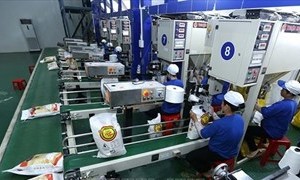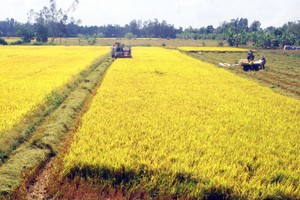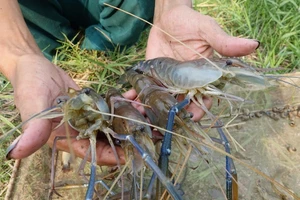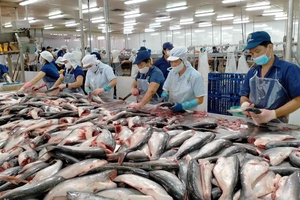Mekong Delta agricultural output has dropped as many seafood breeders have stopped working, complaining bitterly that they don’t have access to the loans they need.
The farmers need loans to compensate for skyrocketing feed prices, but banks have refused to lend, saying that many farmers have been negligent in paying off their debts.
Impasse
Tan Loc Island in the city of Can Tho’s Thot Not District used to be well-known for its tra fish breeding farms. The industry had developed rapidly and many once poor farmers had become rich quickly several years ago.

In the past, when tra fish went for good prices, Tan Loc was called “the island of billionaires” as farmers jetted around on their motor-boats along the Hau River. Many even flooded the area’s roads with brand new cars.
However, the island of billionaires now has become the island of debts.
According to Tan Loc Ward’s People’s Committee, the issue began in 2008 when tra fish prices plunged and farmers were unable to sell due to an oversupply.
In 2009, many households continued investing large funds in their farms with the hope of regaining the lost capital. Nevertheless, the prices still remained low, leading them to pile debts on top of their debts.
In the beginning of this year, tra fish prices increased slightly but then continued falling alongside surging feed prices.
Tra fish breeders in the area now owe banks about VND100-200 billions (US$5-10 million) in total, and many simply can’t pay.
The prices for 1,000 square meters of land to breed tra fish in Tan Loc used to cost from VND200-300 million, but it is now worth only half that and there are no buyers.
In Thuan An fishing village, also in Thot Not District, the condition is not any better.
Thuan An tra breeder Vo Van Nam said that last year he bred about 200 tons of fish, resulting in a loss of VND2 billion (US$105,000). He has sold all his property but still can’t pay all his debt.
Since the beginning of 2010, he has visited tens of banks to ask for loans to continue breeding tra fish, but all of them rejected his application, he said.
Nguyen Thi Le in Lai Vung District of Dong Thap Province said that fish breeders now have no way to access more loans as all of their properties have already been mortgaged at banks.
In the meantime, several farmers have begun borrowing from loan sharks at 5-10 percent a month. Now, they can’t pay off those loans either.
According to Dr Duong Nghia Quoc, deputy director of Dong Thap Province’s Department of Agriculture and Rural Development, the tra fish breeding in the province was just 1,100 hectares this year, 700 hectares less than during the same period last year.
In other delta provinces, 40-50 percent of ponds have been abandoned, he said.
Le Chi Binh, director of An Giang Fisheries Association, said that breeding fish now requires big capital.
He said to breed 100 tons of tra fish, a farmer needed at least VND1.7-1.8 billion (US$90,000-95,000). Most breeders cannot afford the steep expenses without loans from banks.
After over two years of losses, farmers will “drown” if banks do not release “buoys”, Mr. Binh said.
Shrimp situation
Although shrimp prices recently rose, breeders still do not have enough capital for production as shifting weather conditions and a long-lasting drought have damaged thousands of shrimp breeding farms.

A host of households have asked for bank loans to continue farming, but many farms have had to close due to the lack of funds.
Ngo Van Thu, chairman of Thanh Phuoc Commune’s People’s Committee in Binh Dai District of Ben Tre Province said that seafood is the province’s main economic industry, but it was unstable. He said farmers needed bumper crops to even think about paying off loans. Without huge harvests, they were doomed to fall deeper into debt, he said.
Help on the way?
Nguyen Duy Nhat, deputy general director of Nam Viet Seafood Company, said shrimp and tra fish export processors were now short on raw materials. If banks keep their doors closed to seafood breeders, several households would not be able to continue farming and the shortage would be worse.
Departments of agriculture and rural development in the delta provinces have proposed that banks reconsider their credit policies to help breeders reinvest and maintain production to pay debts.
Le Van Tho, director of the Bank for Agriculture and Rural Development in Can Tho, said that the bank so far had lent fish breeders in districts of O Mon, Thot Not and Vinh Thanh VND400 billion (US$21 million) in total. However, since the beginning of 2010, the bank has limited lending as fish farming has proved unstable.
Tho said breeders would have to present specific and feasible production plans in order to obtain loans.
Mr. Tho revealed that the bank had recently provided capital for 12 seafood enterprises to invest in breeding, processing and exporting.
Accordingly, the businesses place orders from breeders and the bank would offer farmers preferential loans under guarantee of the businesses.
To sustainably develop the seafood industry, it is necessary to reduce spontaneous breeding and strengthen the direct links between breeders and big businesses, Tho said.
























